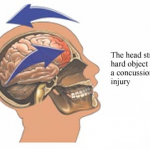Hello Everyone,
I had a person email this question and I thought it may be a good refresher for everyone on a very common accident and injury that effects many different age groups and many different people.
Below is the question and the answer follows below that.
Dear Roy,
I had an injury yesterday playing baseball I ran into another player. I don’t really remember what happened. I was told I hit my head on his chin and on the way down, my chin hit his knee, and then hit my head on the ground. I was knocked out. When I woke, I didn’t know what happened and could not move or talk for about a minute. Then, when I went to get up, my legs collapsed. So I went to the emergency room for a CT scan. No bleeding to the brain, but had an extreme headache. Now the next day, head still hurts and my neck is sore but not as bad. the ER doc said everything looked fine, but could not really say if I have a concussion or not. He said I have the “symptoms”. I guess my question is, when should I go back to work? The doc only took me off for a day but I am still in pain.
Hello J—-,
Concussions can be very tricky. They may not show up on CT or Xray and you can really feel lousy for a while after the initial accident. If you don’t feel capable of returning to work, it’s always best to allow your body the ample time required to heal prior to putting your body back in a stressful situation. However, that’s the perfect case scenario. It’s pretty common that those of us who work, may have to return to work prior to feeling 100%. If this is the case and you cannot get your doctor to write a letter for additional recovery days for your employer, make sure you watch your signs and symptoms and listen to your body. If you become dizzy, nauseated, develop a headache etc., these can lingering signs of a concussion but may not be serious enough for you to be hospitalized. But if you handle heavy equipment or must be at your best to stay safe, keep others safe, or do the level of job required of you, this should probably be communicated to your professional health care provider and see if an extra bit of recovery time could be allowed.
It’s never any fun getting a “Konk On The Melon” and even less fun dealing with the lingering side effects while duty is calling the patient back to work.
Keep an eye on your symptoms and as most any health care provider would tell you, if your symptoms worsen, you become more painful and not less painful over time, if you have numbness, tingling, have a seizure, headache increases, get more dizzy not less dizzy or have a decreased level of consciousness, 911 should be called and you should be seen in the Emergency Room.
Other wise, if the symptoms don’t get worse but get better though are still lingering a few days, it may be within normal recovery expectations and you simply need to take it easy and allow yourself to recover. If you are ever in doubt, don’t hesitate to contact your medical professional and let them know what your symptoms are and see if they want to reassess the situation.
I found a well laid out guideline for definitions and signs and symptoms from a website and I’ll pass the information on to you along with the link for credit to the referenced website.
www.centerforbrainhealth.net
Sports Concussion
It’s more than just a bump on the head
MYTHS about sports concussion…
1. Concussion is a minor brain injury with no long-term effects
2. If you weren’t knocked out, then you didn’t have a concussion
3. Having multiple concussions is common in sports and no cause for concern
4. Symptoms of a sports concussion will always clear up, usually in a few days
5. If there’s no visible injury, everything’s okay
6. You should play through the pain—get back in the game!
FACTS about sports concussion…
1. Twenty percent of all concussions are sports-related
2. A concussion doesn’t always knock you out
3. Having one concussion increases your chances of having another
4. Symptoms of a concussion can last hours, days, weeks, months, or indefinitely
5. Concussion can cause disability affecting school, work, and social life
6. Returning to contact or collision sports before you have completely recovered from a concussion may lead to more serious injury and can increase your chances of long-term problems
What is a concussion?
Concussion is a mild traumatic brain injury that occurs when a blow or jolt to the head disrupts the normal functioning of the brain. Some athletes lose consciousness after a concussion but others are just dazed or confused. Concussion is usually caused by a blow to the head, but can also occur due to whiplash.
How can you tell when an athlete or person gets a concussion?
Sometimes, but not always, the athlete will be knocked out. In cases where there is no obvious loss of consciousness, the athlete may appear to be confused or disoriented (such as running in the wrong direction), and may not remember things that happened before or after the concussion, such as what period it is or the score of the game. Often, the athlete will describe some symptoms of a concussion, such as headache, dizziness, nausea, or blurred vision. It is also common for athletes to describe feeling “fuzzy” or “foggy” after concussion, and to have problems with balance or coordination. For this reason, and also because symptoms can sometimes worsen rather than improve, careful observation of the athlete after concussion is especially important.
What is post-concussion syndrome?
Post-concussion syndrome is a term that describes the physical, cognitive, and emotional symptoms that are caused by concussion and which can last for a varying amount of time after injury. Some symptoms show up right away, but others may not appear or be noticed until the next day or even later. Likewise, some symptoms might resolve fairly quickly, but others—especially fatigue—can persist much longer. The number and severity of symptoms, the speed of recovery, and the impact of symptoms on day-to-day functioning will be different for each athlete.
Physical Symptoms…
* headache
* neck pain
* nausea
* lack of energy and constantly feeling physically and mentally tired
* dizziness, light-headedness, and a loss of balance
* blurred or double vision and sensitivity to light
* increased sensitivity to sounds
* ringing in the ears
* loss of sense of taste and smell
* change in sleep pattern especially waking up a lot at night
Social and Emotional Symptoms…
* mood changes including irritability, anxiousness, and tearfulness
* decreased motivation
* easily overwhelmed
* more impulsive and disinhibited
* withdrawn and wanting to avoid social situations
Cognitive Symptoms…
* feeling ‘dazed’ or ‘foggy’
* difficulty concentrating and paying attention
* trouble with learning and memory (especially for recent events)
* problems with word-finding and putting thoughts into words
* easily confused and loses track of things
* slower in thinking, acting, reading, and speaking
* easily distracted
* trouble doing more than one thing at a time
* lack of organization in everyday tasks
How long does it take to get better?
Most people do recover completely from a concussion, usually in a matter of days. However, it can take up to a year or longer for some athletes to recover, and in some cases the symptoms won’t go away. Recovery may be slower in those who have already had one or more concussions, and in those who have a history of learning disability or attention disorder.
When it is safe to return to play after concussion?
There are several guidelines for return to work/play after concussion. All of these share some common principles:
1. An athlete who has suffered a concussion should be removed from competition immediately and monitored for post-concussion symptoms
2. An athlete should not return to play before he or she is completely symptom-free at rest and after exertion for a specified period of time, which varies based on the athlete’s history and the severity of the concussion.
3. Athletes who have a history of one or more previous concussions should be treated more cautiously (not returned to play as quickly) than those who have suffered their first concussion
4. When in doubt, sit them out!
How can you tell when an athlete is symptom free?
An athlete should only return to competition when it is clear that there are no lingering symptoms of concussion. Unfortunately, because concussion is an invisible injury, and because athletes may minimize or not recognize persistent post-concussion, symptoms, this can be a tricky matter. Also, symptoms may sometimes go away, only to come back after physical or mental exertion.
Most often, return to play decisions are made without the benefit of neuropsychological testing and are based on observation and player report of symptoms. Neuropsychological testing provides the coach or team physician with information that can help to take the guesswork out of concussion management and return-to-play decisions. Using a battery of tests of memory, reaction time & processing speed, we can provide specific information regarding the severity of injury and a standard for evaluating recovery from injury. It is of benefit for athletes to receive baseline assessment prior to or at the beginning of the athletic season to allow for within-subjects analysis of scores following an injury.
I hope this helps J—- and I hope you feel better real soon.
Thanks for the question.
Best Wishes,
Roy, RoyOnRescue.com
royonrescue@gmail.com

